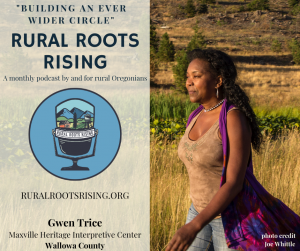
Join us as we dive into the shared history of Oregonians and its long-lasting impacts on our communities. In episode 5 we join Gwendolyn Trice as she reaches into the past to inform the present and breaks open divides to share the incredible lives of not only Black loggers in Wallowa County but also Native American, Greek, and Japanese loggers and the overlapping but distinct discrimination they faced.
Building an Ever Wider Circle features Gwen Trice from the Maxville Heritage Interpretive Center in Wallowa County. Gwen is creating accessible ways for people to grapple with racism in Oregon through learning about the experiences of multicultural loggers who have called Wallowa County home for generations. If you are interested in connecting with rural Oregonians who are grappling with racism in your area, head to www.rop.org to learn more about Rural Organizing Project (ROP) and how you can get involved.
Download this episode’s transcription here.
More on what you hear in this episode:
To learn more about Gwen’s work, check out the Maxville Heritage Interpretive Center and watch the OPB documentary: The Loggers Daughter. The Maxville Heritage Interpretive Center website also has more information about ongoing programs including ones that can bring Maxville to your home town such as the Timber Culture Traveling Exhibit.
To learn more about the founding of Oregon as a white utopia, we encourage everyone to watch author and educator Walidah Imarisha’s 2016 presentation “Why Aren’t There More Black People in Oregon?” The presentation leads viewers through a timeline of Black history in Oregon and discusses how this history continues to shape our social and political landscape. You can also check out this article by Walidah, which includes a timeline of Black history in addition to her reflections on the presentations she has done around the state.
Are you part of a rural museum or heritage organization that is interested in rural social equity? H.O.R.S.E (Heritage Organizations for Rural Social Equity) has resources that can help! Check out the website to learn more.
Did you like the music in this episode? Listen to more Oregon-made music by The Road Sodas, Gene Burnett and Plz Responder.
Rural Roots Rising is a production of the Rural Organizing Project. Thank you for listening!
- KBOO


